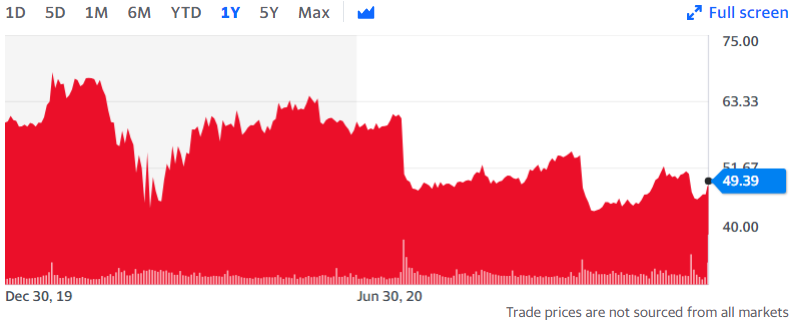塾長です。
昨日(米国12/29)の米株市場は、若干下落。
S&P500、3,727(-0.22%)
Nasdaq、12,850(-0.38%)
Russell2000、1,959(-1.85%)
【米国市況】株は反落、米景気対策強化への期待が後退-ドル下落 - Bloomberg
トランプ&民主党が求めている個人給付引上げ法案が上院で阻止されたようで。相変わらずの茶番劇:
米上院共和党、個人給付を2000ドルに引き上げる民主党の試み阻止 - Bloomberg
債券、為替は、
10年債、0.9350
ドル円、103.55
指標は、
10月 ケース・シラー米住宅価格指数、235.77
同[前年同月比]、7.9%(予想6.9%)
米20都市住宅価格指数、2014年以来の大幅な伸び-市場予想上回る - Bloomberg
個別株では、ヘッジファンドThird Pointを率いるアクティビスト、ダニエル・ローブが、Intelに対して”strategic alternative”(会社分割などの手段を通じ、垂直統合型半導体企業からの変革)を要求。
ローブ氏、インテルに戦略的選択肢の検討要求-分割や資産売却など - Bloomberg
Exclusive: Hedge fund Third Point urges Intel to explore deal options | Reuters
CNBCで、上記Bloombergの内容以上に報道しているのは・・・:
・Third Pointが今年9月末以降にIntel株を取得したらしい
・Third Pointが前回プロキシーファイトまで発展させたのは、2年半前のCampbell Soup。その時はThird Pointにとって最良の結果とはならかったようだ。※1
・10月、Third PointがDisneyに送ったレターのように※2、普通、これほど強い言葉使いはしない。今回の口調はとても強い。
※1:Cambell取締役会に、Third Pointが推薦する2名を加え、手打ちになった事を報じたニュース。
Campbell Soup reaches truce with Third Point, will add two to board
※2:Third PointがDisneyに配当支払いを停止し、そのカネでストリーミングサービスを強化しろと迫った:
Activist investor Dan Loeb urges Disney to end dividend to fund streaming content | ロイター
Third Pointは2019年、Sonyにも喧嘩を売っていました:
サード・ポイント、ソニーの要求拒否に失望-「改善策見えず」 - Bloomberg
アクティビストである彼らはの要求は、市場から嫌われる事もあれば、歓迎されることもある。今回は後者。
この報道が出た今日、Intel株は+4.93%の49.39ドルで着地。
半導体業界が5G、AI、自動運転・・・と好調の中、この1年の株価推移がこれではネ:

ローブの手紙も落ちていたので、貼っておこう:
Dear Dr. Ishrak:
As you know, Third Point LLC recently took a significant stake in Intel Corp (the “Company”). Despite its theoretical competitive advantage as the world’s leading semiconductor business, Intel’s shares have dramatically underperformed those of its peers on a one, three, and five-year basis. It has lost over $60 billion of market capitalization over the past year alone. Third Point has engaged with companies facing other versions of “rough patches” for over two decades, and we would like to suggest concrete steps the Company should take to address its pressing challenges. Considering that you have been Board Chairman for less than a year, we appreciate that many of these issues have come under your purview only recently. Still, we hope that you share our view that Intel’s substantial problems must be handled with the utmost urgency.
Once the gold standard for innovative microprocessor manufacturing, Intel has lost its pole position to TSMC in Taiwan and Samsung in South Korea. Previously reliably able to progress its process technology every 2-3 years, Intel has been stuck at its 14-nanometer node since 2013, while TSMC and Samsung both transitioned to 5-nanometer this year and are developing more advanced process geometries. Intel’s plan to roll out its 7-nanometer node late 2022 or early 2023 will place the Company several years behind its Asian peers for at least the first half of this decade. This lag in advanced semiconductor manufacturing is a vulnerability that must be corrected.
The loss of manufacturing leadership and other missteps have allowed several semiconductor competitors to leverage TSMC’s and Samsung’s process technology prowess and gain significant market share at Intel’s expense. Under the visionary leadership of Dr. Lisa Su, AMD put its liquidity concerns behind it and has been taking meaningful market share in Intel’s core PC and data center CPU markets with its Ryzen and EPYC product lines. NVIDIA’s GPUs have dominated the nascent market for training complex computational models used in AI applications, a market in which Intel has largely been absent. While these companies are U.S.-based and display the breadth of America’s semiconductor design expertise, they operate no fabs themselves and leverage manufacturing in Asia to produce their products.
This raises a critical concern – the vital role of Intel’s products and services to America’s national security. In this respect, you lead one of America’s most essential boards. Without immediate change at Intel, we fear that America’s access to leading-edge semiconductor supply will erode, forcing the U.S. to rely more heavily on a geopolitically unstable East Asia to power everything from PCs to data centers to critical infrastructure and more.
From a governance point of view, we cannot fathom how the boards who presided over Intel’s decline could have permitted management to fritter away the Company’s leading market position while simultaneously rewarding them handsomely with extravagant compensation packages; stakeholders will no longer tolerate such apparent abdications of duty. Of special concern is Intel’s human capital management problem and the absence of an articulated plan to address it. The Company has lost many of its most inspiring and talented chip designers and leaders, and our sources indicate that those who remain (several of whom are highly regarded in the industry) are becoming increasingly demoralized by the status quo. Intel was built on the vision of engineering genius and, without the best talent, the current trajectory will not be reversed. Solving Intel’s human capital management issue should be the Board’s most urgent task.
Considering these and other challenges, we suggest the Board retain a reputable investment advisor to evaluate strategic alternatives, including whether Intel should remain an integrated device manufacturer and the potential divestment of certain failed acquisitions. As to the former issue, recent industry developments suggest many customers (such as Apple, Microsoft and Amazon) are now developing their own in-house silicon solutions and sending those designs to be manufactured in East Asia. You must be able to offer new independent solutions to retain those customers rather than have them send their manufacturing away. Just as Netflix uses Amazon’s AWS for cloud services, Intel must figure out how to serve its competitors as customers.
While we believe it is in the best interest of the Company to release this letter publicly and share our views with fellow shareholders and other stakeholders, there are other specific issues we would like to discuss privately and look forward to a constructive dialogue to help Intel chart a new course. Although we expect these conversations to be productive, we are filing for Hart-Scott-Rodino approval with the Federal Trade Commission to acquire incremental common shares and engage more actively with the Company, as well as to preserve the option to submit nominees for election to the Board at the 2021 Annual Meeting should we sense a reluctance to work together to address the concerns we have raised in this letter. While we have no agreements in place, we have specific recommendations regarding certain changes that we are confident will resonate with the Board and fellow shareholders.
We look forward to discussing this with you soon.
Sincerely, Daniel S. Loeb
言っている事は至極真っ当。こんな感じ:
TSMCにプロセスルールで負けている。Samsungにも負けている。AMDにシェアを奪われている。Apple, Microsoftは独自チップを設計し使うと言っている。Intelがリードを奪われている間、経営者は巨額の報酬を得てきた。株主としてそんなことはもう許せない。人的資産をないがしろにしているのも問題だ。
会社がひとたび腐りだすと、元に戻すのはとても大変。成功例は少ない。
Intelは好きな会社でした(過去形)が、今回はパス。